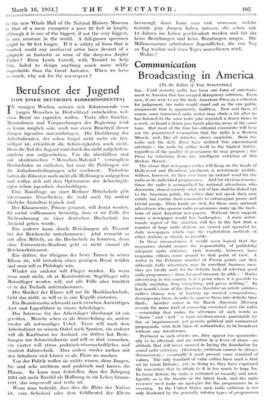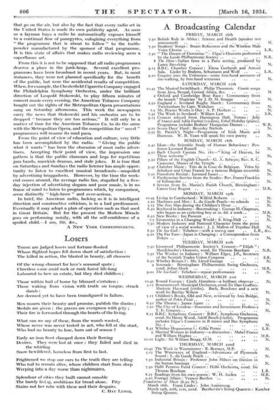Communtcation
Broadcasting in America
[To the Editor of THE SPECTATOR.] SIR,—Until recently radio has been one form of entertain- ment in America that has escaped derogatory criticism. Even now, if one were to use the daily American Press as a criterion for judgement, the radio would stand out as the one public amusement that is, apparently, faultless. Now and then, of course, some tormented radio writer may chafe a bit after he has listened to the same radio joke repeated a dozen times in a week, or heard a dozen jazz bands playing away at the same tune. But most of the time his editorial comments will bear out the popularized assumption that the radio is a Modern Miracle, and, like all miracles, above suspicion. Both the radio and the daily Press have utilized this supernatural attribute : the radio by selling itself to the highest bidder, regardless of the quality of programme he may propose ; the Press by refraining from any intelligent criticism of this Modern Miracle.
• The abuse that newspaper critics will heap on the heads of Hollywood and Broadway producers is notoriously prolific. Seldom, however, do they ever have an unkind word for the radio or its individual programmes. And for obvious reasons. Since the radio is monopolized by national advertisers who determine, almost entirely, what sort of fare shall be dished out to the American public, the critics dare not speak their own minds, but confine their comments to extravagant praise and trivial gossip. Their hands are tied, for these same national advertisers who sponsor radio programmes make up the back- bone of most American newspapers. Without their support many a newspaper would face bankruptcy. A more unfor- tunate aspect of the situation still lies in the fact that a number of large radio stations are owned and operated by daily newspapers which copy the exploitation methods of other stations as closely as possible.
In these circumstances it would seem logical that the magazines should assume the responsibility -of publishing adequate radio criticism. Only recently, however, have magazine editors conic around to that point of view. A writer in the February number of Forum points out that although radio advertisers may be excellent business men. they are totally unfit for the delicate task of selecting good radio programmes ; then, for good measure, he adds : " Radio advertising in this country is at a point where it is possible to clarify anything, deny everything, and prove nothing." In last month's issue of the American Spectator an article satirizes radio's clumsy way of hacking up musical compositions, decomposing them, in order to squeeze them into definite time limits. Another writer in the March American Mercury reveals the inane kind of censorship exercised over the radio —censorship that makes the utterance of such words as " damn " and " hell " a legal misdemeanour, punishable by fine or imprisonment, yet permits political and commercial propaganda, with little basis of authenticity, to be broadcast
• without any interference.
Pertinent as such articles are, they appear too spasmodic- ally to be effectual, and are written in a fever of abuse—an attitude that will never succeed in laying the foundation for sound radio criticism. Obviously, criticism cannot be always denunciatory eventually it must present some standard of values. The only standard of value critics have used is that set by Great Britain ; yet, in doing so, they have expressed the conviction that to attain to it is too much to hope for. In Great Britain the radio is criticized as casually and intel- ligently as is the theatre or the latest book, and the radio reviewer need make no apologies for the programmes he is covering. In the United States such radio criticism is not only deadened by the generally inferior types of programmes that go on the air, but also by the fact that every radio set in the United States is made its own publicity agent. As soon as a layman buys a radio he automatically exposes himself to a continual flow of panegyrics, eulogizing everything from " the programme that is about to follow " to the tooth- powder manufactured by the sponsor of that programme. It is this state of affairs that makes radio reviewing seem a superfluous art.
From this it is not to be supposed that all radio programmes deserve a place in the junk-heap. Several excellent pro- grammes have been broadcast in recent years. But, in most instances, they were not planned specifically for the benefit of the public, but were the accidental results of competition. When, for example, the Chesterfield Cigarette Company engaged the Philadelphia Symphony Orchestra, under the brilliant direction of Leopold Stokowski, to play fifteen minutes of concert music every evening, the Ameridan Tobacco Company bought out the rights of the Metropolitan Opera presentations sung on Saturday afternoons. This week the newspapers carry the news that Stokowski and his orchestra are to be dropped " because they are too serious." It will only be a matter of time for the American Tobacco Co. to do the same with the Metropolitan Opera, and the competition for " novel " programmes will resume its mad pace.
From the point of view of education and culture, very little has been accomplished by the radio. " Giving the public what it wants " has been the obsession of most radio adver- tisers. Accepting their point of view, the impression one gathers is that the public clamours and begs for repetitious jazz bands, mawkish dramas, and stale jokes. It is true that on Saturdays and Sundays the radio listener has ample oppor- tunity to listen to excellent musical broadcasts-unspoiled by advertising braggadocio. However, by the time the week- end comes around, the average radio fan, stupefied by a five- day injection of advertising slogans and poor music, is in no frame of mind to listen to programmes which, by comparison, seem distinctly " high-brow " and over-serious.
In brief, the American radio, lacking as it is in intelligent direction and constructive criticism, is in a bad predicament. Eventually it may adopt a plan of operation such as that used in Great Britain. But for the present the Modern Miracle goes on performing noisily, with all the self-confidence of a spoiled child.-I am, Sir, &e.,
A NEW YORK CORRESPONDENT,











































 Previous page
Previous page